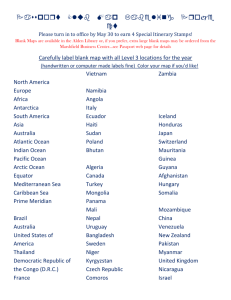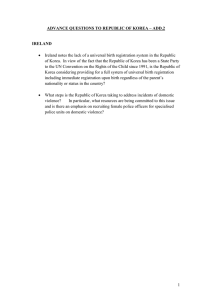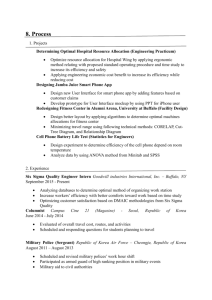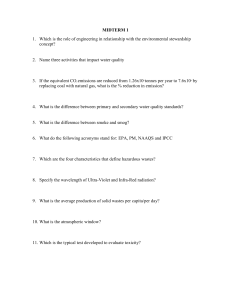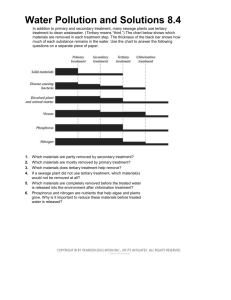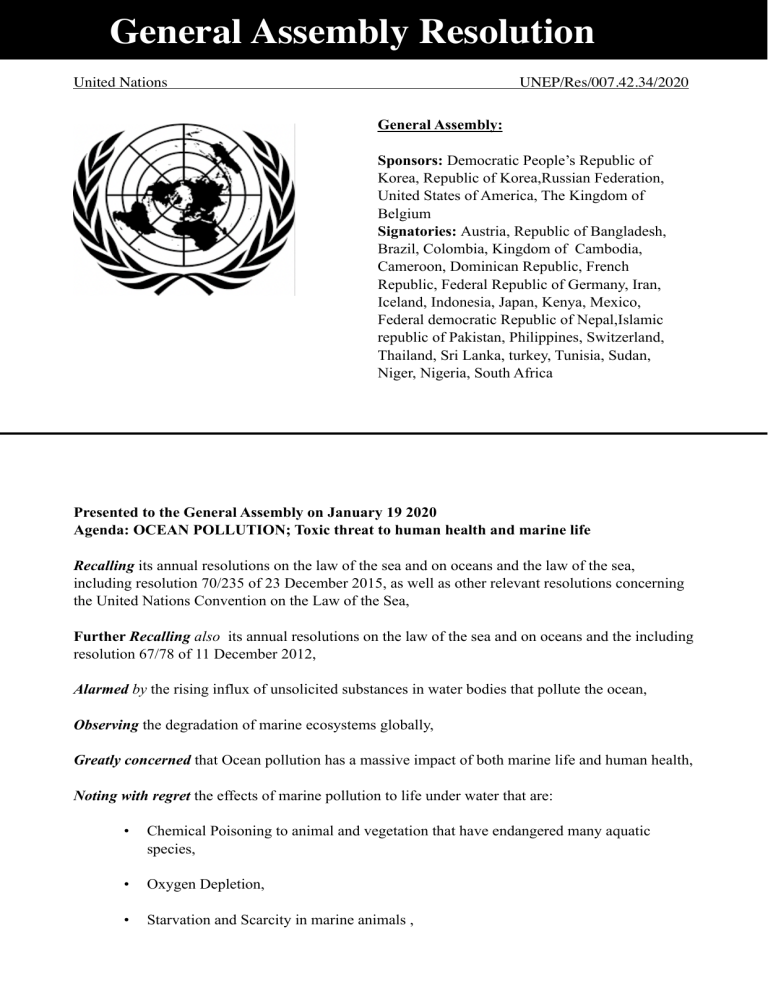
General Assembly Resolution United Nations UNEP/Res/007.42.34/2020 General Assembly: Sponsors: Democratic People’s Republic of Korea, Republic of Korea,Russian Federation, United States of America, The Kingdom of Belgium Signatories: Austria, Republic of Bangladesh, Brazil, Colombia, Kingdom of Cambodia, Cameroon, Dominican Republic, French Republic, Federal Republic of Germany, Iran, Iceland, Indonesia, Japan, Kenya, Mexico, Federal democratic Republic of Nepal,Islamic republic of Pakistan, Philippines, Switzerland, Thailand, Sri Lanka, turkey, Tunisia, Sudan, Niger, Nigeria, South Africa Presented to the General Assembly on January 19 2020 Agenda: OCEAN POLLUTION; Toxic threat to human health and marine life Recalling its annual resolutions on the law of the sea and on oceans and the law of the sea, including resolution 70/235 of 23 December 2015, as well as other relevant resolutions concerning the United Nations Convention on the Law of the Sea, Further Recalling also its annual resolutions on the law of the sea and on oceans and the including resolution 67/78 of 11 December 2012, Alarmed by the rising influx of unsolicited substances in water bodies that pollute the ocean, Observing the degradation of marine ecosystems globally, Greatly concerned that Ocean pollution has a massive impact of both marine life and human health, Noting with regret the effects of marine pollution to life under water that are: • Chemical Poisoning to animal and vegetation that have endangered many aquatic species, • Oxygen Depletion, • Starvation and Scarcity in marine animals , • Change in Water Hydrogen and Ionic Concentration of the ocean, • Depletion of Biodiversity and Extinction, • Disturbance in the natural ecosystem , Having Studied the effects of Ocean pollution on Human health to be: • • Damage in the nervous system and cancer because of the carbonates and organophosphates contained in Pesticides , • Accumulation of lead in the body that damages the central nervous system, • liver damage, skin cancer and vascular diseases caused by the presence of Arsenic and Petrochemicals, • transmission of other communicable diseases, Convinced that the leading causes of marine pollution are: • Over production of Plastic and improper management of plastic waste, • Oil spills and ocean acidification that approximately kill 8,332 species and create life less dead areas in the ocean, • Increasing rates of Industrial and household waste and it’s Poor management, Believing that other indirect factors also play a role in contamination of the oceans, these factors may include : • Mining, • Tests of military weapons on the ocean, • Agricultural waste, • Bad Sewage systems, • Climate change and emission of green house gases , Recognizing the attempts made by UN member states to combat this issue Appreciating the initiatives taken by The Democratic People’s Republic of Korea,Republic of Korea, Malaysia and Indonesia by importing foreign wastes and recycling them, Emphasizing on loss of Australian and Brazilian wildlife , Taking note the complexity of the scenario in the Korean Peninsula, Guided by the sustainable development goals no.12:Ensure sustainable consumption and production patterns, no.13:Climate Action and no.14Life below water, United Nations General assembly, 1.Trusts the UN member states to form and implement national policies promoting the conservation of Ocean with harsh punishments given to offenders; 2. Requests all UN member states to look in to and sign Convention on the International Regulations for Preventing Collisions at Sea,Protocol to the International Convention for the Prevention of Pollution From Ships,Agreement for the Establishment of the Intergovernmental Organization for Marketing and the Paris climate agreement; 3. Endorses UN member states to include environment conservation course in their curriculum; 4.Restricts industries to dispose wastes through in-house methods: (a) Industries will only be allowed to sell their wastes to the third party organizations like the ones mentioned in clause 5 of this resolution; (b) Industries caught disposing wastes into the ocean or with out a third party organization will be heavily penalized; 5.Encourages UN member state to have a national organization dedicated to manage disposal of waste: (a) The mention organization can be privately own or governmental; (b) The mentioned organization will be tasked to collect wastes form industries and citizens alike and then dispose the waste following proper environmental friendly protocols; (c) Governments should also run periodic inceptions on the industries and the responsible organization to ensure the wastes are being managed properly; 6.Encourages Industries to use recycled material opposed to raw materials; 7.Supports nations which import foreign wastes and recycles them; 8.Strongly encourages UN member states to limit and reduce the production plastic; 9.Recommends UN member states to recycle as much as non bio-degradable as possible; 10.Urges UN member states to switch to bio-plastics and other alternatives such as G lass,Stainless steel,Platinum silicone, Bamboo, Paper and Cellophane; 11.Further urges the UN member states to look in to Cellophane: (a) As cellophane carries similar properties to polytene but is bio degradable; (b) As cellophane is easy to produce; 12.Suggest the UN member states to invest in advanced engineered process in their sewage infrastructure; 13. Further Trusts the UN member states to restrict the entry of sewage into water bodies; 14.Reminds the UN member states to carry out regular maintenance of sewage systems to: (a) Prevent leakages; (b) Fix Faulty sewage processing units; 15.Requests the nations to carry out detoxification on sewage waste and other toxic wastes; 16.Suggests biomethanation as a means not only to dispose waste but also as a means to generate alternative energy; 17.Endorses UN member states to reduce carbon emissions; 18.Recommends UN member states to slowly switch towards alternative energy (a) Initially only Stronger economies will be requested to switch over to alternative energy; (b) Once developing and under Developed economies have built their capacity as mentioned in resolution 71/257 they will also be requested to switch over to alternative energy; 19.Urges the UN member states to use organic fertilizers and set limits on the use of chemical fertilizers; 20.Considers the use of dispersants and polyglú to clean the oceans and fresh water ; 21.Takes note of the offers made: (a) by the Democratic People’s Republic of Korea send it’s official to other nations to clean the gyre regions; (b) by the republic of Korea about the green climate fund leading to support for under developed and developed; 22.Draws the attention to segregation of toxic waste from other wastes: (a) Citizens should dispose waste separately on the the basis of their properties; (b) The organization mentioned in of this resolution should also segregate toxic waste from other wastes; (c) The separated Toxic waste must be detoxified; 23.Advices The UN member states to dispose of radioactive waste by: (a) Recycling the waste product to generate more nuclear energy as done by the French Republic and Kingdom of Belgium ; (b) Storing the remains away from any habitat, in proper storage chambers underground; 24.Authorizes a temporary removal of sanctions restricting the Democratic people’s Republic of Korea to import foreign waste for the purpose of recycling; 25.Strongly approves of a international coalition to remove wastes from the gyre regions; 26.Encourages developed nations to fund under developed nations to facilitate the. Adoption of alternative sources, waste water management plant other technologies; 27.Further invites developed countries to initiate in combating the environment issue with the developing and least developed countries; 26.Authorizes the UN member states to increase the taxes on industries with high plastic wastes and carbon emission; 27.Calls upon the creation of a specialized UN body funded by the UN and other willing donors than can deal with the countries that are ruining the values under the environmental conservation programs and essential procedures with any difference: (a) This UNO will have the ability to fine the countries or organization found guilty of environment related violations; (b) Designates a section of this said court to deal with countries and organizations who adopt the policy disrupting environment; and 28.Encourages all the counties are the members of the UN to come up diplomatic solution and maintain a friendly relation with all UN members states.
